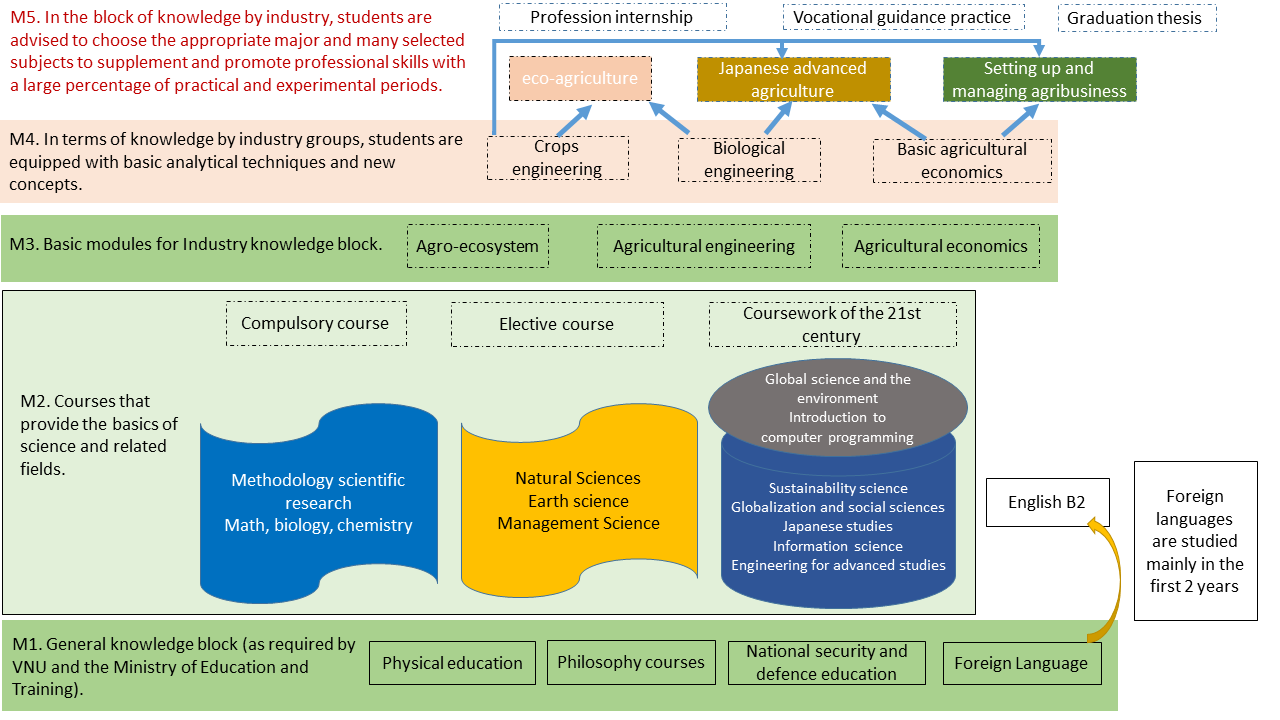ENGINEER'S PROGRAM IN SMART AGRICULTURE AND SUSTAINABILITY
Introduction
- Name of training industry:
- English: Smart Agriculture and Sustainability
- Vietnamese: Nông nghiệp thông minh và bền vững
- Code of training industry: 7620122 QTD
- Degree: Engineer
- Graduation diploma name
- English: The Degree of Engineer in Smart Agriculture and Sustainability (Honors Program)
- Vietnamese: Kỹ sư Nông nghiệp Thông minh và Bền vững (chương trình đào tạo chất lượng cao)
- Time of educate: 4 - 5 years
The Smart and Sustainable Agriculture program that integrates knowledge of agricultural sciences, information technology, and economics so that the students have all the necessary knowledge to be creative in a digital economy and have the ability to manage the agricultural supply chains from production to marketing. The programe includes three intensive directions: (1) “Agroecology”, which aims to shed deep insights into complexity of agricultural ecosystem and create its sustainable management, and (2) “Japanese-style agricultural engineering”, which aims to realize Society 5.0 in the agricultural sector by utilizing advanced science and technology such as robotics, AI, and IoT, and (3) “Start-up in agriculture and Enterprise management”, which aims to create and manage businesses oriented toward the development of agriculture in harmony with ecosystems and human values.
.jpg) |
Career opportunity
Graduates can take up the following positions:
- Engineer in charge of technical, farm supervision in Vietnam, Japan or other countries.
- Engineer of production operation of high-tech agricultural systems (at clean agricultural farms, organic agriculture, etc.)
- Engineer/specialist at science transfer research centers and institutes.
- Enterprises of agricultural materials, tourism businesses, golf courses and resorts, Departments of Agriculture and Rural Development.
- Continue to study for MSc, PhD at some of domestic and international universities and research institutions.
Superiority of the program
1. Liberal Arts education
The philosophy of Liberal Education helps learners to understand broad knowledge of nature and society, in-depth specialized knowledge to open the door to future careers.
2. High-quality program
High-quality program based on the curriculum of the University of Tokyo.
3. Lecturers
- 63 Vietnamese lecturers with doctorate degrees who have studied and worked in developed countries around the world, are capable of teaching bilingualism.
- 41 lecturers come from the Schools and Research Institutes of the University of Tokyo and the Japanese partners of the University.
4. Focus on fostering foreign language ability
- The training program is designed with many modules taught in English, so the student after graduation will have an English level equivalent to B2, level 4 in the 6-step scale of Vietnam Foreign Language Competency Framework. In addition, students can learn basic Japanese and can register for advanced Japanese lessons according to their needs.
- International academic environment with the participation of many international lecturers.
5. Modern learning method
- Many modules in the training program use active learning method (active learning).
- Based on the experience of Japanese universities, the program will introduce seminar format into some modules to develop communication, discussion, teamwork skills and enhance interaction between lecturers and students, between students and students.
6. High practicality
- The content of the modules is highly practical, with the participation in teaching of many experienced experts from Japanese and Vietnamese organizations and businesses.
- Students will have the opportunity to interact with organizations and businesses through Internship programs.
Program and Learning pathway
1. Training program
The training program consists of 155 credits, which includes the following blocks of knowledge:
- General knowledge block: 21 credits
- Knowledge blocks by field: 33 credits
- Knowledge blocks by industry: 27 credits
- Knowledge by industry group: 21 credits
- Industry knowledge block: 53 credits
2. Learning pathway
The learning path is divided into two main phases:
The knowledge blocks are built including two main parts, which are general knowledge and compulsory background for all students, focusing on the M1 knowledge block, when studying to the M2 knowledge block onwards, there are many directions for students to select. Depending on the problem posed, under the guidance of the lecturer, students will build a learning path in accordance with their abilities and interests.

Lecturers
The lecturers of the training program for Smart Agriculture and Sustainable includes lecturers from Vietnam Japan University, long-term dispatched lecturers from partner universities, research institutes and Japanese enterprises, inside and outside Vietnam National University, Hanoi, research institutes and enterprises in Vietnam. This is a force of highly qualified, integrated, multidisciplinary and experienced staff, ensuring the operation of training programs according to the philosophy of liberal arts education for sustainable development.
The University of Tokyo is the main partner of the training program, represented by Assoc. Dr. Eriko Yasunaga, Program Advisor.
Scholarship information
At least 20% of the students receive full or partial scholarships;
There are also business-sponsored scholarships for Hanoi National University.
Details of scholarships are available here.
Program Curriculum
The program curriculum is available here.
Learning outcome
1. Knowledge and Professional Competence
1.1. General Knowledge
- PLO 1: Apply the knowledge of political theory and law in professional activities, research, and practice.
- PLO 2: Meet the English proficiency requirements at level 4 according to the 6-level foreign language proficiency framework for Vietnam.
1.2. Knowledge in the field of study
- PLO 3: Evaluate the sustainability of an agricultural system based on knowledge of agricultural ecology, advanced agriculture, sustainable agriculture, agricultural economics, energy conservation, sustainable development, culture, environment, and innovative technologies for development.
1.3. Knowledge in the field of major and specialized areas
- PLO 4: Apply knowledge of agricultural climate, ecosystem, specific growing conditions, and plant development to design appropriate agricultural models and crops, ensuring agricultural products meet quality standards in Vietnam and globally.
- PLO 5: Ability to use knowledge of programming, data analysis, digital technology, and mechanical engineering in the construction of automation systems for agriculture.
- PLO 6: Apply knowledge of economics and policies to analyze and evaluate agricultural trade issues and solve certain problems in agricultural economics, accounting, and production management.
1.4. Knowledge of innovation
- PLO 7: Propose research ideas in related fields; develop agricultural models and solutions for sustainable agriculture that meet the challenges outlined in specific problems.
2. Skills
2.1. Professional Skills
- PLO 8: Develop skills to work in laboratories such as plant breeding, genetic engineering, and analyzing the environmental impact on plant growth, soil, and fertilizer analysis.
- PLO 9: Understand the basic information about crops, environmental conditions, and external factors to construct, manage, and operate natural or artificial agricultural systems (greenhouses, networks, and plant factories).
- PLO 10: Utilize specialized software for agricultural production, design, and management, and control automated systems in artificial cultivation systems and precision agriculture.
2.2. Personal Skills Development
- PLO 11: Develop critical thinking and teamwork skills, confidently present research ideas, and communicate production ideas to scientific or public audiences. Organize and arrange work effectively, and cultivate entrepreneurial thinking.
- PLO 12: Ability to identify, evaluate, and analyze agricultural trends and technologies to create opportunities for personal and group development within the agricultural field.
- PLO 13: Ability to self-learn, engage in research, and advance professional knowledge to adapt to changes in the working environment.
3. Professional Qualities
- PLO 14: Demonstrate awareness of environmental protection, particularly regarding green spaces, and take action to prevent negative impacts on agricultural systems, food safety, and the environment. Show social responsibility, adhere to legal regulations, and contribute to community services.
4. Autonomy and Responsibility
- PLO 15: Demonstrate responsibility, integrity, perseverance, and professional ethics in all activities, ensuring product safety, worker health, and community well-being in agricultural operations. Display a high level of responsibility for personal and team tasks and leadership.
Admissions
Admissions Targets: 50 students / course
Admission method:
- Admission is based on the results of the assessment of qualifications (including academic records, achievements in high school.., interviews).
- Admission in another way:
– Admission is based on High School Exam Result in year.
– Admission of international foreign language certificates (English, combined with 02 subjects of high school graduation exam in year).
– Admission of results on the SAT.
– Admission of A-Level Certificate.
– Direct admission and admission to specialized high schools.
– Direct selection of candidates to participate in international competition teams or win national prizes.
– Admission is based on the results of the competency assessment exam of VNU.
Contact
Program Office
5th Floor, Vietnam Japan University, Luu Huu Phuoc Street, My Dinh 1 Urban Area, Nam Tu Liem District, Hanoi
Program contact:
Phone: (+84) 24 73066001 – Ext 5093
Hotline: (+84) 966 954 736 (Zalo) – (+84) 96 96 38 426
Email: admission@vju.ac.vn

